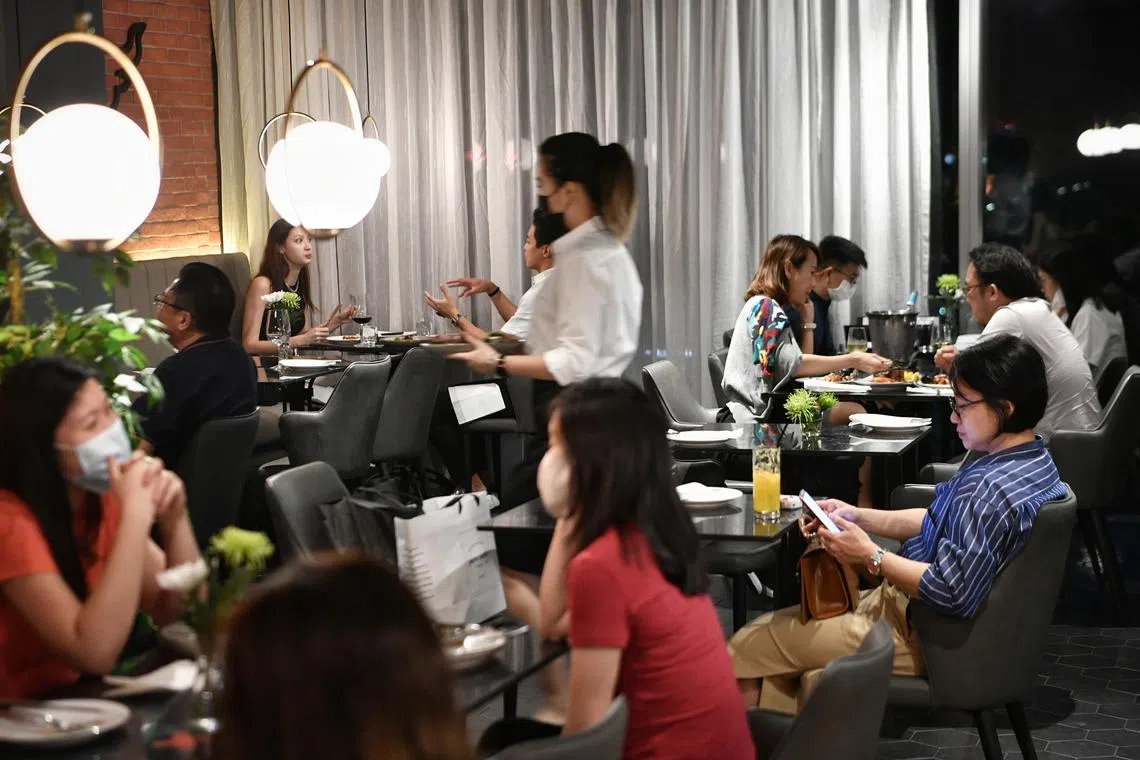Part-timers’ pay higher than pre-Covid-19 levels as travel, festivities return in full swing
Sign up now: Get ST's newsletters delivered to your inbox

The number of part-time jobs has increased significantly, especially in retail, F&B and hospitality sectors.
PHOTO: ST FILE
SINGAPORE – Part-timers were more sought after during the year end than they were in the past few years, even before the Covid-19 pandemic, with travel and festivities back in full swing in 2022.
Due to stiff competition for manpower and soaring inflation rates, part-timers were paid, on average, up to a third more in 2022 compared with 2021.
According to job portals and recruitment agencies The Straits Times approached, the number of part-time jobs available rose significantly – especially in the retail, food and beverage (F&B), events, hospitality and logistics sectors – to cater to the seasonal surge.
Recruitment firm RecruitFirst cited a spike of more than 60 per cent since October.
Job portal WorkClass said that compared with quieter periods, demand in November and December for part-timers in transport and logistics jobs rose by 55 per cent and 62 per cent, respectively.
Not only did job opportunities for part-timers boom from October 2022, but the number of openings also surged more during the 2022 festive period, compared with 2021 or pre-pandemic 2019.
JobStreet Singapore noted that more companies started hiring part-timers one month earlier, from October, in 2022, compared with the year before.
FastJobs, another portal, found its part-time job postings climbing by nearly a third in the fourth quarter of 2022, compared with the same period in 2021.
And compared with the last quarter of 2019 before the pandemic hit, there was a jump of over 70 per cent in the number of part-time jobs posted during the same period in 2022, it said.
Institute of Policy Studies senior research fellow Faizal Yahya said that some sectors could have had foreign employees taking leave during the festive year-end season and so businesses may have required more part-timers to fill the void.
National University of Singapore labour economist Kelvin Seah said Covid-19 restrictions have lifted substantially compared with the festive season in 2021.
“People are eating out more, shopping more, and out of their homes more, so there is greater business activity in Singapore,” he said, explaining that this raises demand for goods and services and, in turn, part-time workers.
Dining at food and beverage establishments and hotel accommodation demand will go up as well, especially with travellers returning, he said.
Ms Alice Yeung, sales and marketing director of logistics firm J&T Express, said: “Over the course of the pandemic, we saw the rise of online shopping leading to an increase in demand for delivery services, which has exacerbated a manpower shortage.”
To manage the surge in demand driven by shopping periods such as 11.11, Black Friday, 12.12, Christmas and New Year’s Day, the firm typically increases manpower over November and December for positions like warehouse assistants and drivers, she said.
“We hired over 40 per cent more part-timers during 2022’s festive season compared with business-as-usual periods. During last year’s shopping festivals, part-timers made up about 30 per cent of all employees.”
Commonwealth Capital, whose investment portfolio includes F&B brands such as Pastamania, Udders and The Soup Spoon, as well as manufacturing, logistics and retail services, said it has been facing a manpower shortage throughout 2022 and the issue was aggravated during the festivities.
Its brands require 10 per cent to 20 per cent more part-timers during this period.
JobStreet Singapore said that in general, part-time jobs on the portal paid about 20 per cent more in 2022 than in 2021.
WorkClass noted that based on its postings on its platform, there was a larger raise for part-timers on the lower end of the pay scale.
In 2021, 64 per cent of hourly part-time salaries were between $8 and $10. In 2022, 68 per cent of these salaries were between $10 and $12.
WorkClass said the part-timers who saw one of the highest wage hikes – nearly a third more – were packers. Their average hourly starting salary of about $8 in 2021 rose to $11 in 2022, based on job postings.
Dr Seah said: “A dollar now buys less than a dollar one year ago, so workers expect higher wages to maintain their standard of living and firms have little choice but to pay higher wages.”
He added that even though 30 per cent is a substantial increment, he thinks it is reasonable.
Even with higher wages, many businesses have still struggled to fill short-term vacancies during the year end.
Ms Lim Huishan, general manager of FastJobs Singapore and Philippines, said: “The increase in job postings in 2022 compared with previous years has made the market even more competitive, so while jobs are being filled fast, we do observe that businesses may have difficulty hiring enough job seekers to fill all the required vacancies.”
Commonwealth Capital said its brands’ hourly wages are generally higher by about 10 per cent to 15 per cent during the festive season, but in a tight labour market, it is expected that not all vacancies will be filled.
To combat the manpower crunch, businesses may transform through digitalisation and automation, as well as reskilling workers to work with new technology, said Dr Faizal.
Ms Yeung said that at J&T Express, warehouse layout, sorting strategy and other processes were improved to boost productivity by 30 per cent in preparation for year-end sales.
“At the end of the day, it is not just about hiring more hands on deck but also about maintaining a good balance between our manpower and efficiency levels,” she said.
Ninja Van Singapore commercial head Kooh Wee Hou said the logistics firm invests in technology such as parcel scanners that tell sorters where items should go, and a route optimisation system that enables drivers to deliver packages more efficiently.
“We hired roughly the same number of part-timers (in 2022) as our last festive season in 2021, despite parcel volume increment,” he said.
As the labour crunch persists, the increase in part-time salaries will likely continue.
Mr See Yang Foo, who is managing director and country head at workforce solutions provider Persolkelly Singapore, said that employers will likely boost wages in 2023 to entice talent to join the retail sector. “In the fast-moving consumer goods and retail sectors, retail businesses are dealing with a manpower crunch due to a shrinking pool of Singaporeans willing to work in the service sector,” he said.
Ms Lee Sin Yee, a fourth-year psychology undergraduate at Nanyang Technological University, has been working in part-time jobs since 2014.
“I wanted to be financially independent as much as possible, to be able to buy the things I like without having to ask for money from my parents,” she said.
The 24-year-old has had seven part-time roles including server, warehouse worker and teacher.
Despite higher part-time salaries during the festive season that may even be doubled on public holidays, she will not take them up if they clash with school commitments such as inter-hall competitions.
She has taken days off from working as a part-time teacher for a kindergarten enrichment programme that pays $25 an hour to take part in such school activities.
“The jobs usually look for people to fill in at specific periods with fixed dates and timings. I prefer to have the flexibility to choose when I want to work,” she said.



